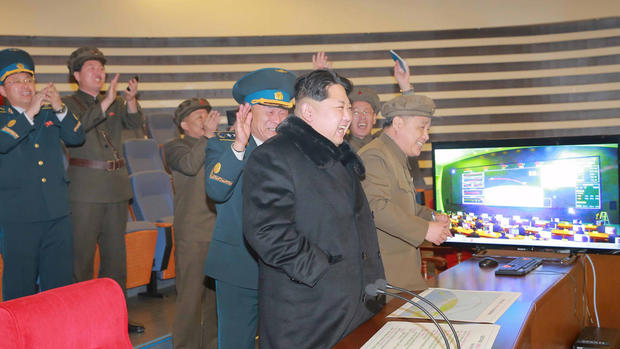N. Korea's controversial satellite is tumbling again
WASHINGTON - For a moment there, it seemed like North Korea's boisterous claims about its space prowess were correct.
After the controversial rocket launch over the weekend, analysts initially said the satellite on board -- which many dismiss as a ruse for testing missiles capable of reaching the U.S. -- was "tumbling through orbit," defense officials told CBS News.
Then on Tuesday U.S. defense officials said it appeared to have stabilized in its orbit.
Now, however, Pentagon officials tell CBS News the latest satellite is once again out of control in its space trajectory and therefore is likely useless.
North Korea claims to have put four satellites into orbit, but the first two have never been confirmed by anyone else.
Experts worldwide agree it got one into orbit in 2012 and NORAD, which is hardly a propaganda mouthpiece for Pyongyang, now has both that and the satellite launched on Sunday on its official satellite list.
Kwangmyongsong 4, the satellite launched Sunday, has the NORAD catalog number 41332 and Kwangmyongsong 3-2, launched in 2012, is 39026. They are described as Earth observation satellites, and weigh about 220 pounds apiece.
Their main applications, according to Pyongyang, are monitoring the weather, mapping natural resources and forest distributions and providing data that might help farmers improve their crops.
Whether they actually can achieve those purposes is another matter.
No signals from the previous satellite, which North Korea claimed transmitted the "Song of General Kim Il Sung" and "Song of General Kim Jong Il" after achieving orbit, have ever been confirmed by outside observers. That might be because it was never stable enough to transmit anything back home.
Regardless of the new satellite's efficacy, the world is beginning to turn on North Korea over it, because many believe it is part of a larger nuclear program.
Senate leaders pledged on Wednesday to take swift action on legislation imposing more stringent sanctions on North Korea for willfully violating international law by pushing ahead with its nuclear weapons program.
Majority Leader Mitch McConnell, R-Ky., said the Senate has an opportunity to hold Pyongyang accountable for its growing aggression. His Democratic counterpart, Minority Leader Harry Reid of Nevada, said, "there is perhaps no nation on this planet more dedicated to fear and intimidation than North Korea."
The bill targets North Korea's ability to access the money it needs for developing miniaturized nuclear warheads and the long-range missiles to deliver them, according to the legislation's backers.
Washington, Seoul and others consider the launch a banned test of missile technology. That assessment is based on Pyongyang's open efforts to manufacture nuclear-tipped missiles capable of striking the U.S. mainland and that the technology used to launch a rocket carrying a satellite into space can be applied to fire a long-range missile.
In the annual assessment of global threats delivered to Congress on Tuesday, Director of National Intelligence James R. Clapper said North Korea has expanded a uranium enrichment facility and restarted a plutonium reactor that could start recovering material for nuclear weapons in weeks or months.
Both findings will deepen concern that North Korea is not only making technical advances in its nuclear weapons program, but is working to expand what is thought to be a small nuclear arsenal. U.S.-based experts have estimated that North Korea may have about 10 bombs, but that could grow to between 20 and 100 by 2020.
Clapper said that Pyongyang has not flight-tested a long-range, nuclear-armed missile but is committed to its development.
Underscoring the difficulty of understanding North Korea's actual intentions, Clapper said the U.S. does not know whether North Korea would use nuclear weapons for defensive or retaliatory purposes.
But Clapper said U.S. intelligence has "long assessed that Pyongyang's nuclear capabilities are intended for deterrence, international prestige, and coercive diplomacy."
North Korea already faces wide-ranging sanctions from the United States and under existing U.N. resolutions is prohibited from trading in weapons and importing luxury goods.
The new legislation seeks additional sanctions - both mandatory and at the discretion of the president - against the government of North Korean leader Kim Jong Un and those who assist it.
It would require the investigation and punishment of those who knowingly import into North Korea any goods or technology related to weapons of mass destruction; those who engage in human rights abuses, money laundering and counterfeiting that supports the Kim regime; and those who engage in "cyber-terrorism."
The bill also bans foreign assistance to any country that provides lethal military equipment to North Korea, and targets Pyongyang's trade in key industrial commodities.
